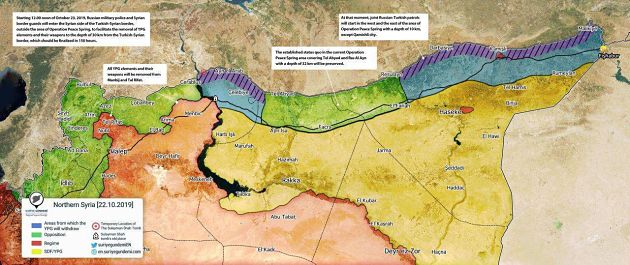The 6-hour meeting between Erdogan and Putin yesterday and the Memorandum of Understanding signed as a result allow us to finalize our preliminary conclusions about the last Turkish operation in Syria. In addition to general points such as the commitment to the territorial integrity of Syria and the fight against separatism and terrorism, the memorandum specifies the following:
1. The existing status quo will be maintained in the current area of the operation «Peace Spring» between Tal Abyad and Ras Al Ain, up to a depth of 32 km.
2. Starting from 12:00 on October 23, 2019, units of the Russian military police and the Syrian border service will be deployed on the Syrian side of the Syrian-Turkish border outside the zone of operation «Peace Spring». They will contribute to the withdrawal of YPG units and their weapons to 30 km from the Syrian-Turkish border, which should be completed within 150 hours after 12:00 on October 23, 2019. From that moment, the joint Russian-Turkish patrols will begin to a depth of up to 10 km from the border to the west and east of the «Peace Spring» operation zone, except for the city of Kamishli.
6. All YPG units and their weapons will be withdrawn from Manbij and Tall Rifat.
9. A joint monitoring and verification mechanism will be established to verify and coordinate the implementation of this agreement.
10. The two sides will continue to work for a political solution to the Syrian conflict within the framework of the «Astana Mechanism» and support the activities of the Constitutional Committee.
After the signing of this memorandum, Russian Foreign Minister Lavrov stated that the Turkish military operation «Peace Spring» is over, which means that Turkey and its allied Syrian National Army have gained a territory of 150 km (and with a depth of 32 km) instead of the 440 km previously announced by Erdogan. This confirms the assumption made in our previous article that «Turkey may not have initially claimed the entire territory, but only part of it in the area between Ras Al Ain and Tell Abiad up to the M4 road, as well as the northern zone of the Manbij Protrusion».
What can be said about that? Of course, gaining 150×32 km is better than nothing and better than losing the same amount, although there are reasons to believe that this modest gain may be followed by new losses — in Idlib. The need to achieve the declared objectives of the «Peace Spring» operation, which would allow the expansion and consolidation of the Syrian rebels’ territories and compensate for the imminent loss of Idlib, was precisely due to the high probability of an attack on it by regime forces supported by Russia and Iran and the understanding that Turkey could turn a blind eye to it for various reasons, as it has already done in Aleppo, Hama and Khan Shaykhun.
The political reasons or, if you like, the geopolitical aspect of this problem are also interesting. Erdogan, who until the last moment had promised to take control of 440 km when it already seemed unrealistic, finally agreed to limit himself to 150 km as predicted. This is normal behavior for a merchant in a bazaar, but it is not solid behavior for the ruler of a world power or a sultan, as he is sometimes portrayed by his apologists. The same applies to the geopolitical position of Turkey as a whole, which must be assessed realistically. Of course, the achieved 150 km out of the claimed 440 km can be seen as an illustration of a well-known political saying: «To get what you need, you have to ask for the impossible». But if Turkey considers it impossible to even announce the result of many years, which is 440 km in the desert, what can we say at all? What global ambitions, what unity of the Islamic Ummah around it? It has long been clear that all this is empty talk and unrealizable dreams, and this history has once again confirmed it.
Meanwhile, if we have confirmed it once again as a result of this operation, Turkey’s opponents and Erdogan personally have become even more convinced that he is a threat that must be stopped. The sad irony is that Erdogan has received the same consolidation against Turkey in the world and the same resistance that would have arisen if Turkey had launched a massive offensive to achieve its stated goals. As a result of the operation, only a small part of the goals has been achieved, while all its negative consequences are fully manifested.
The main consequence, of course, is the increase of alienation from the West, whose attitude towards the whole Syrian saga can be described as highly hypocritical. Yesterday’s developments should be seen in this context. Many are wondering why Erdogan agreed with Putin on worse terms than those that opened up for him after the agreements reached with Pence. In our opinion, the answer lies in the fact that Erdogan sees how the machinery that was launched against Gaddafi when he began to be demonized as a global evil is now being launched against him, and he understands that Trump, who is himself under siege in the United States, will not be able to stop this machinery even if he wanted to. And so it is better to rely on the shoulder of his colleague in misfortune, who has already found himself in this position, in order to resist this pressure together.
Will this shoulder be reliable for Erdogan? Only time will tell, although in our opinion the answer is rhetorical…

